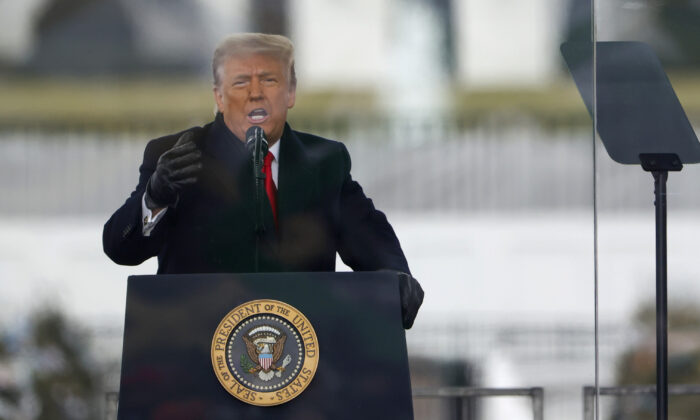Bitter Speaker Nancy Pelosi took her first shot at removing President Trump from office before January 20 yesterday, introducing a resolution via unanimous consent to call on Vice President Mike Pence to invoke the 25th Amendment to remove President Trump.
She is demanding lawmakers "act with urgency," trying to use her powerful position to take out her personal revenge on a President she claims to "pray for every day."
"Impeachment," she says is next.
Will she succeed? And if so, how will it serve our country's best interests?
Be informed, not misled.
Pelosi"s revenge.
The 25th Amendment.
She plans to bring up her resolution again today. If the Democrats all follow her demands, the resolution will pass.
I'm pretty sure VP Mike Pence will not come running when she whistles.
Mooney said Pelosi "should not attempt to adopt a resolution of this magnitude without any debate on the floor of the US House of Representatives," noting it "is wrong to have sent members of Congress home and then try to adopt, without any debate, a precedent-setting resolution that could imperil our Republic. The House must never adopt a resolution that demands the removal of a duly elected president, without hearings, debate or recorded vote."
But Pelosi is driven by hatred of Trump, not love of country.
After the resolution was blocked, Speaker Pelosi said publicly, "The House Republicans rejected this legislation to protect America, enabling the President's unhinged, unstable and deranged acts of sedition to continue. Their complicity endangers America, erodes our Democracy, and it must end."
Pelosi told CBS's "60 Minutes" Sunday that she "prefers" using the 25th Amendment over impeachment to dispose of Trump, but the 25th Amendment requires Pence and a majority of cabinet members to initiate it.
Yesterday Rep. Tom Emmer (R-Minn), the head of the campaign arm for the Republicans, said while what happened at the Capitol last week "has no place in our democracy" because it is "disgusting and dangerous...It is a politically motivated effort by Nancy Pelosi and House Democrats that will fracture our nation even more instead of bringing us together."
But it isn't about unity or even about our country---it's all about Nancy and her tantrum toward Trump.
Impeachment
Yesterday the House Democrats also introduced an article of impeachment and charged the President with "incitement of insurrection."
Their resolution says the President "willfully made statements that, in context, encouraged---and foreseeably resulted in---lawless action at the Capitol."
What Trump actually said was "let us walk down Pennsylvania Avenue"...to "peacefully and patriotically make our voices be heard."
But the impeachment resolution says that his words caused the crowd to "unlawfully breach the Capitol, injure and kill law enforcement personnel, menace members of Congress, the Vice President and Congressional personnel, and engage in other violent, deadly, destructive and seditious acts."
Harvard Law Professor Emeritus Alan Dershowitz, a Democrat, says "Democrats in the House have virtually no chance of succeeding."
He says cannot come to trial in the Senate. Because the Senate has rules, and the rules would not allow the case to come to trial, according to the Majority Leader, until 1 PM on January 20th, an hour after President Trump leaves office."
And you can't impeach a "former president."
Is America a "Democracy" or a "Republic" and does it matter?
Have you noticed that Democrats almost always call America a "democracy" while Republicans nearly always---not always, but nearly always call America a "Republic?"
Does it matter, and what's the difference?
It does matter. When our Founding Fathers were writing our Constitution, they envisioned the United States as a republic. Alexander Hamilton and James Madison made this clear in the Federalist Papers. They clearly layout the fact that the "federal government will be made up of elected officials who represent the will of the people."
In fact, many of our Founders believed that a direct democracy would result in nothing "more than instability, injustice and confusion." As a result, the US Constitution outlines a system of government that allows people to fairly vote on representatives, and those representatives make laws in accordance with the people's will.
In order to be a Republic, people must elect the person who will serve as head of state---president, through what our Founders called the electoral college.
In a republic, laws are made directly by the representatives chosen by the people and must comply with a constitution that specifically protects the rights of both the majority and the minority.
In our Republic, an official set of fundamental laws, like our Constitution and Bill of Rights, prohibits government from limiting or taking away certain "inalienable" rights of the people.
The Democrat Party has been calling for abolishing the electoral college, which would result in a direct, or popular vote.
The Democrats know that if they can move our country from a republican form of government to a true "democracy," they can ensure political wins in perpetuity because about 6 or 8 major, far-left city populations would decide every federal election---much like Seattle does in Washington State and Portland in Oregon.
Our Founders knew this would create "instability, injustice, and confusion." It always does.
Keep in mind that Russia considers itself a "republic"---so does North Korea. So did Rome.
And all have or had "elections."
When a republic is transformed into a direct democracy and the integrity of the election process is put in question---it's only a matter of time.
A republic requires eternal vigilance by the people, that's why Ben Franklin told the lady who asked what kind of government he and the other founders had given us---He said, "a republic, if you can keep it."
We are a republic. The question is "can we keep it?"
These are the concerns of at least 75 million people in America as we look at the last election---now nearly in our rearview window.
Be Informed. Be Vigilant. Be Discerning. Be Prayerful. Be Bold.



